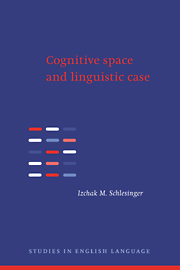2 - Agent and subject
Published online by Cambridge University Press: 20 October 2009
Summary
I never know how people are able to pick out thematic relations with such security, I can't.
Chomsky (1982: 89)The semantics of the subject
It is generally held that the syntactic category of subject is semantically heterogeneous. While most subjects express the Agent of the action, there are those that express the Experiencer, the Instrument, the Patient or the Theme, to name only some of the cases that have been associated with the subject.
Now, the rationale for introducing cases in the grammar is that they enable us to state certain semantic–syntactic correspondences. As pointed out by Dowty (1988,1991), the most important generalizations that can be stated in terms of cases pertain to what he calls argument selection, as for instance in the selection of the sentence subject. Having observed that the subject is semantically heterogeneous, some linguists have gone on to propose subject selection hierarchies. Case categories are ordered in respect to the subject. First in line stands the Agent. If the sentence includes an Agent, the latter becomes subject; if not, the subject is the noun phrase in the case next in line.
There has been little agreement among linguists as to the precise sequence of cases in the hierarchy (compare for instance the hierarchies proposed by Fillmore, 1968; Givón, 1984a: 151; Broadwell, 1988: 117; and Jackendoff, 1990: 258). Moreover, there is an element of arbitrariness in all the hierarchies that have been proposed.
- Type
- Chapter
- Information
- Cognitive Space and Linguistic CaseSemantic and Syntactic Categories in English, pp. 28 - 59Publisher: Cambridge University PressPrint publication year: 1995

